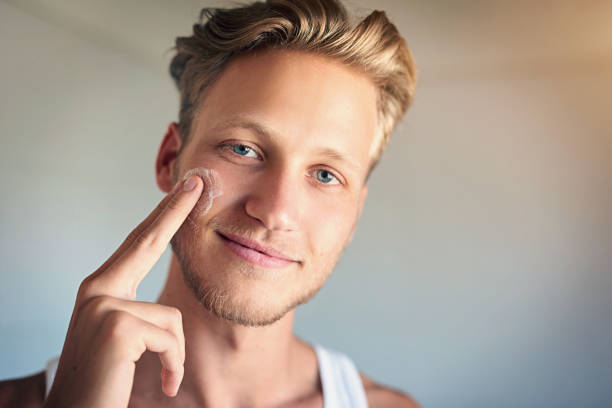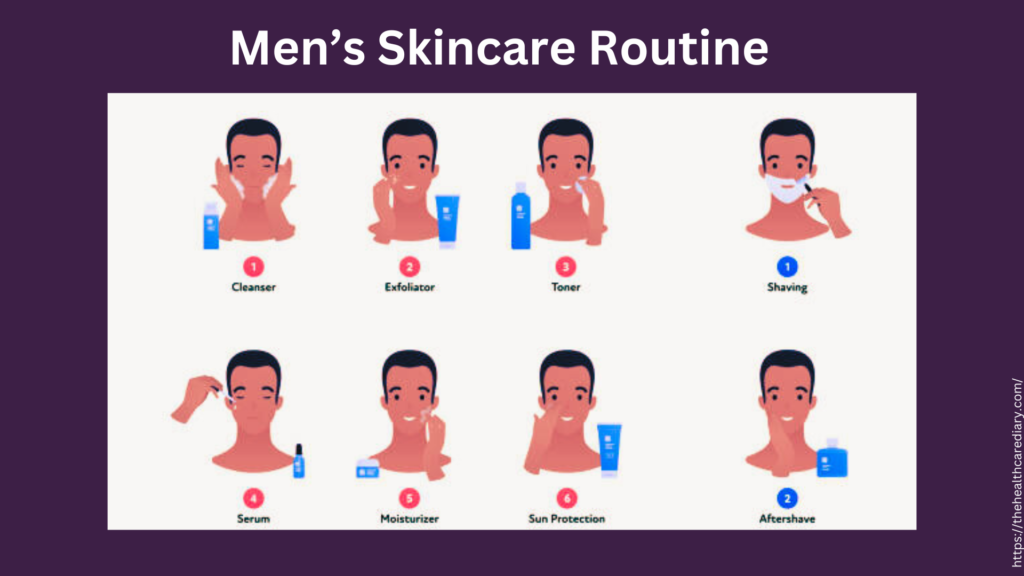
Taking care of your skin is not just about looking good—it is about maintaining skin health, preventing premature aging, and increasing confidence. With men’s skincare gaining popularity, it is more important than ever to understand the right routine for your skin type. Whether you have oily, dry, sensitive, or combination skin, the right regimen can help prevent acne, reduce black spots, and keep your skin hydrated and young.
This guide provides a science-backed skincare routine, approved by dermatologists, that suits all men. It also includes skincare tips, home remedies, and expert advice for healthy, glowing skin.
Keep your skin looking its best by staying updated on the top skincare products for men, effective anti-aging solutions, and essential daily grooming tips.
Why Men Need a Skincare Routine
Due to high testosterone levels, men’s skin is about 25% thicker and produces more sebum than women’s. This makes a daily skincare routine necessary to manage excess oil, reduce acne, and protect against environmental damage. Additionally, men often shave regularly, causing irritation and razor burn. If the skin is not well prepared or moisturized, it succumbs to hair.
A targeted skincare routine not only improves overall skin health but also enhances the presence, confidence, and long-term welfare of a man. If you want to combat acne, stop wrinkles, or get a fresh look, taking care of your skin should be an essential part of your daily grooming habits.
Step-by-Step Daily Skincare Routine for Men
- Cleansing – the foundation of skincare
Removes dirt, oil, and impurities to prevent stuffed pores.
The best material: See for salicylic acid (for oily/acne-prone skin), hyaluronic acid (for dry skin), and glycerin (for sensitive skin).
How to do this correctly: Use a soft, sulfate-free cleanser with lukewarm water, twice (morning and night). - Exfoliation – Unlock bright skin
Dead skin removes cells, opens pores, and improves skin texture.
Best content: glycolic acid, lactic acid, or natural scrub (avoid hard scrubs that can cause micro-tiers).
Use: 2-3 times a week (avoid getting out daily to prevent irritation). - Toning – Balance of pH levels
The pores shrink, restore the pH of the skin, and present the skin for better absorption of products.
The best material: Witch hazel (for oily skin), rose water (for sensitive skin), and niacinamide (for acne-prone skin).
How to apply: Use a cotton pad or spray directly on the face after cleaning. - Moisturizing – Hydration is the key
Prevents dryness, strengthens skin obstruction, and reduces signs of aging.
Best material for all types:
Oily skin: gel-based, non-comedogenic moisturizer with hyaluronic acid.
Dry skin: Cream-based moisturizer with ceramides and shea butter.
Combination skin: light moisturizer with niacinamide.
Sensitive skin: fragrance-free, soothing formula with aloe vera.
Pro Tip: Apply moisturizer while the skin is slightly moist to lock in hydration. - Sun Protection–Anti-aging Required
UV protection shields your skin from damage, helps prevent wrinkles, and lowers the risk of skin cancer.
Best material: Comprehensive spectrum SPF 30+ with zinc oxide or titanium dioxide.
How to use: Apply sunscreen every morning, apply again every 2 hours.
Nighttime Skincare Routine
- Double cleansing (for those who use sunscreen or sweat excessively)
First, use an oil-based cleanser to remove sunscreen and dirt. Follow with a water-based cleanser for deep clean holes. - Night serum and treatment
For anti-aging: retinol-based serum (use only at night, and always wear sunscreen the next day).
For acne-prone skin: niacinamide + salicylic acid to control breakouts.
For Hydration: Hyaluronic Acid + Vitamin E.
For brightening: Vitamin C serum also reduces skin tone and black spots. - Moisturizer or overnight mask
Use a slightly heavy moisturizer or a hydrating mask overnight to repair skin at bedtime.

Special Dermatologist-Recommended Skincare Tips
Dermatologists recommend simple but effective skincare habits. Always use lukewarm water instead of hot water to avoid snatching natural oils. Avoid washing your face excessively, it can cause dryness or excess oil production. Patch test new skincare products to prevent allergic reactions. Stay hydrated and eat a balanced diet rich in antioxidants for healthy skin. Finally, prioritize good sleep, as it helps reduce stress hormones that cause breakouts and dullness.
Lifestyle Factors – Diet, hydration, and sleep’s impact on skincare
The lifestyle factors of diet, hydration, and sleep play a huge role in the overall health and appearance of your skin. Here’s a breakdown of each:
Diet: Nourish Your Skin from the Inside
What you eat affects your skin health. A balanced diet rich in antioxidants (berries, citrus fruits), omega-3S (salmon, walnuts), vitamin A (sweet potato, spinach), and zinc (pumpkin seeds, lentils) can promote clear, shining skin. On the other hand, sugar, processed foods, and dairy can trigger acne and inflammation.
Hydration: Keep Your Skin Moisturized
It is important to keep hydrated to maintain healthy skin. Water helps in moisture retention, keeps the skin soft, and helps in detoxification by excluding toxins. Target for 8 glasses of water a day and include foods rich in water like cucumbers and watermelons for added hydration.
Sleep: Allow Your Skin to Repair
Quality sleep is necessary for skin repair. During sleep, the body revives skin cells and produces collagen, which helps in reducing wrinkles and maintain elasticity. Go to 7-9 hours per night, and try to stick to a regular sleep program.
Sleeping on your back can help prevent wrinkles caused by pressure on your skin. When you balance a healthy diet, stay hydrated, and get enough sleep, your skin will be fresh and flexible. These habits support the natural functions of your skin and help prevent common issues such as acne, dryness, and aging.
Natural Remedies & DIY Skincare Hacks
Healthy, glowing skin does not always require expensive products – sometimes, the best skincare solution is natural, inexpensive, and already in your kitchen.
- Oily skin: Use a green tea toner to control excess oil and reduce inflammation.
- Dry Skin: Apply honey as a natural human for deep hydration.
- Acne-prone skin: Use aloe vera gel to calm redness and irritation.
- Dark Circle: To reduce puffiness, apply cold cucumber slices or cold tea bags.
Common Skincare Mistakes to Avoid
Even the best skincare routine can be ineffective if common mistakes are ignored – these can cause breakouts from everyday errors, premature aging, and skin irritation.
- Skipping sunscreen: Sun exposure accelerates aging and pigmentation.
- Using hard soap: Bar soap can disrupt skin obstruction, causing dryness.
- Not moisturizing oily skin: The production of oil increases from skipping moisturizer, which makes the skin greasier.
- Ignoring the skin type: Using the wrong products can cause breakouts or irritation.
Skincare Insights for Men
A well-structured skincare routine should not be complicated. By following this simple, effective daily diet, all types of men can achieve healthy, clear, and small-looking skin.
Stick to dermatologist-supported tips, include science-based ingredients, and avoid normal mistakes to maintain a strong and healthy skin barrier.
Discover more from The Healthcare Diary
Subscribe to get the latest posts sent to your email.
Pingback: Skincare Routine Order: Morning & Night Steps for Healthy Skin - The Healthcare Diary
Pingback: Skin Care Routine for Guys: Men’s Skincare & Body Care Tips - The Healthcare Diary
Pingback: rganic Skin Care for Men | Natural Grooming Routine (UK & USA) - The Healthcare Diary